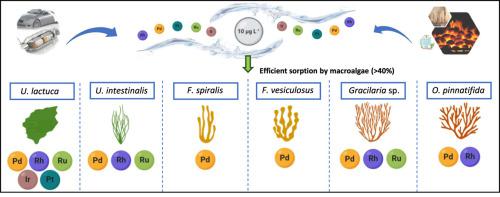Journal of Environmental Chemical Engineering ( IF 7.7 ) Pub Date : 2021-01-19 , DOI: 10.1016/j.jece.2021.105100 João Pinto , Cláudia B. Lopes , Bruno Henriques , Ana F. Couto , Nicole Ferreira , Lina Carvalho , Marcelo Costa , José M.P. Torres , Carlos Vale , Eduarda Pereira

|
Increasing emissions of Platinum-Group Elements (PGE) into marine environments may negatively impact ecosystems services and organisms wellbeing. Removing PGE from contaminated systems using efficient and low-cost technologies can therefore provide a sustainable solution to aquatic systems remediation. Previous studies highlight algae’s high binding ability to metals in solution. Assessing the viability of various algae species to remove PGE from contaminated solutions, while identifying differences in performance among algae and among elements, was the purpose of this study. For this, six macroalgae species (Ulva lactuca, Ulva intestinalis, Fucus spiralis, Fucus vesiculosus, Osmundea pinnatifida and Gracilaria sp., 3 g L−1) were exposed to PGE (Palladium, Rhodium, Ruthenium, Iridium and Platinum)-spiked seawater (10 and 500 µg L−1) for 72 h. Removal rates varied with time and among macroalgae and elements. Palladium was easily removed by all species (up to 83 %), while other PGE showed lower affinity to macroalgae. Removal sequence was Pd > Rh > Ru > Ir > Pt. Initial concentration rise induced faster and higher removal. U. lactuca performed best for all elements, while brown macroalgae were the less effective. Macroalgae external area and chemical composition were considered major factors influencing sorption, although each element and macroalgae should be examined individually. Results evidence living macroalgae (particularly U. lactuca) as a promising alternative to remediate PGE contaminated waters.
中文翻译:

不同污染情景下活藻类对铂族元素的吸附
铂族元素(PGE)向海洋环境的排放量增加可能会对生态系统服务和生物福祉产生负面影响。因此,使用高效和低成本的技术从受污染的系统中清除PGE可以为水生系统修复提供可持续的解决方案。先前的研究强调了藻类对溶液中金属的高结合能力。评估各种藻类从污染溶液中去除PGE的可行性,同时确定藻类之间和元素之间的性能差异,是本研究的目的。对于此,六个海藻物种(石莼,肠浒苔,墨角藻旋毛虫,墨角藻,Osmundea菜和将Gracilaria sp。(3 g L -1)暴露于掺有PGE(钯,铑,钌,铱和铂)的海水(10和500 µg L -1)中72小时。去除率随时间以及大型藻类和元素之间的变化而变化。钯很容易被所有物种清除(高达83%),而其他PGE对大型藻类的亲和力较低。去除顺序为Pd> Rh> Ru> Ir> Pt。初始浓度升高导致更快,更高的去除率。乳酸杆菌对所有元素的效果最佳,而棕色大型藻类的效果较差。大型藻类的外部面积和化学成分被认为是影响吸附的主要因素,尽管每个元素和大型藻类都应单独检查。结果证明存在大型藻类(特别是U. lactuca)作为修复PGE污染水的有前途的替代品。



























 京公网安备 11010802027423号
京公网安备 11010802027423号